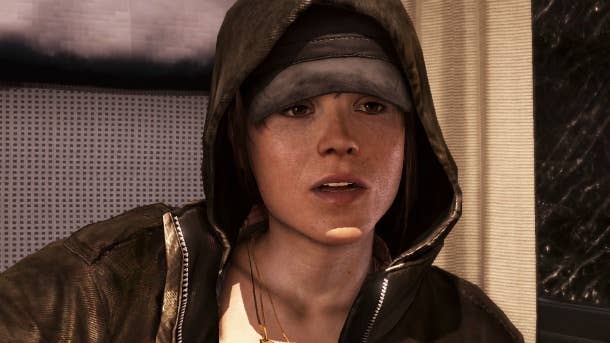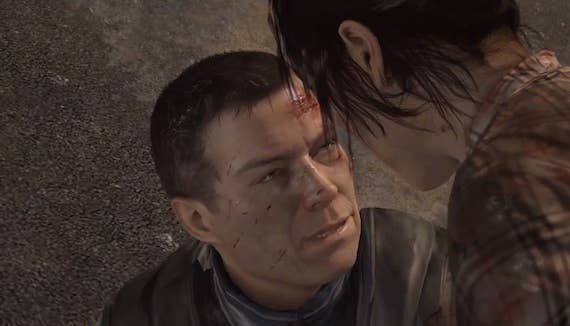Games "will die" if industry doesn't do more to innovate, says Cage
Creator of Heavy Rain and Beyond believes the industry needs to offer "deeper" experiences
E3 wasn't exactly bursting with new IP this year, but one of the few new properties to receive a fair amount of buzz was Quantic Dream's Beyond: Two Souls. After teasing the industry at GDC with his tantalizing Kara demo, showcasing what his next project could do visually and with emotions in characters, David Cage unveiled his new project starring the talented actress Ellen Page.
After a more action-filled presentation than usual from Cage, GamesIndustry International spoke to the developer about the evolution of his game making from Heavy Rain to Beyond, where games and storytelling are headed, and getting past the uncanny valley, among other things.
I don't really think that way. My work is about emotion and how we can trigger different types of emotion within an interactive experience. This is really what my work is about. So we achieved that in Heavy Rain for many gamers, obviously, from what we hear from them. We just try, with Beyond, to tell a different story and to improve in all areas of the game and to come back with a better engine, better graphics, better animation, better acting, better script. But most of all, we're trying to create a stronger experience, something that will be even more emotional, something that will really leave an imprint in the mind of players. If possible, even more than Heavy Rain.
I don't know what the difference is between a game director and a movie director. At some point you're on stage with an actor and you try to get an emotion across. Now, if you're a movie director you're on stage and you have your set and this is one specific technology. Or if you're a game director you're in a motion capture stage and the medium is different. But at the end of the day, what you try to achieve is pretty much the same thing- how can we get these emotions across? How can we make people laugh, cry, smile, whatever? Just because of the story we tell them one way or another.

Yes.
"This industry will die if it doesn't try more to be innovative... How many first person shooters can we create per year? How many can we play per year?"
David Cage
Not at all. If you look at Kara or if you look at Beyond, I was looking for talented actresses who would exactly work with the character. Valerie Curry is not as famous as Ellen, but she's a fantastic actress. I'm really fascinated by what she did on Kara. She was amazing, too. Ellen is famous. Sorry about that. But that's not the reason why she's on board. She's on board because she is Julie Holmes and she's an amazing actress and she's crazy and talented and courageous and she has all these qualities. But I was not looking for a name to put on my pack shots.
Really, no. It's really about her. She's Julie Holmes. That was the most important thing to me. Getting the right person. If she's not famous, that's fine. If she's famous, that's fine. But that's not a reason to hire her. It's really the talent first. And expect this in my next games. You will see famous people or not famous people. I don't care so much.
When I was a younger writer, I was really looking at stories and films and all my ideas came from there. As I get older, that's less and less the case. I just have things I want to talk about and things that relate to me, to my personal life or things I'm interested in that just resonate with me. The two real themes in Beyond are really growing, accepting who you are, and it's probably also about death and inspiration in - I lost someone in my family who I felt really close to and it was really about, what's on the other side? What happens after you die?
It is. It's a very personal thing and we're here at E3 and it's a game show and you need to show some explosions. We need to show that, yeah, we can do that too. But at the same time, I don't think this is the core essence of what Beyond is about. Beyond is really an emotional journey. It's really about sharing the life of someone and being with her during all these years and seeing what she goes through, and at the end of the game, really feeling like you know her by heart. Like if it was someone living and breathing, it's just like, I know her because I know her since she was a kid and I know what she went through.
You know, in most video games story's not very important. It's just a way to tie levels together, but no one cares really about what you have to tell. Also, in many teams, most creative decisions are done by teams, so you have twenty people in a room and they raise their hand if they agree or disagree. This is how creative decisions are made. Actually, this is not the way things are done at Quantum Dream. I work pretty much like an author in many ways. I write very personal things, totally subjective. I think it gives a special tone to the games we make.
It's not up to me to tell the industry what they should or should not do. There are very clever people out there and they know what they want to do. I can only talk for my studio. I wouldn't be interested in making just software to sell to people at Christmas. I'm not that kind of person and I'm not interested in that. I respect people doing this, but it's not how I see my work. I'm interested in using this medium to express something and to trigger deeper emotions. I think you can do it if you make movies, if you make TV series... all expression forms are great for that. But games, we just shoot and jump. What about trying something else and using it?
It's a fantastic medium. It's crazy what you can do with this thing, because the relationship you have with experience is so different from what you have with anything else. You watch a movie, you're just passive. You watch a story, and it's a story that's told to you. But when you're in a game, you can tell the story. You can decide what you want to happen. And you can make up pretty much your own story based on your choices and your moral decisions. That's fascinating.
I wish more people were trying this, but it's not so much about telling the industry you should do games like Heavy Rain or Beyond; the last game I really enjoyed is Journey, for example. Journey was amazing. It has nothing to do with what I'm doing. But it's not so much about storytelling. It's about emotion. It's about trying something different. I mean this industry will die if it doesn't try more to be innovative and to come up with new ideas and to talk a bit more - not necessarily serious, but deeper things at some point. It's great that you can shoot at monsters, and that's great and it will always be there and it will always be successful, but at the same time, what about giving the choice to people? Give them different options. So if they like that they find it, but if they want something deeper and interactive, they can find that too.
No. But I think this industry needs more games like Journey because it's a breath of fresh air; this is necessary in any medium. How many first person shooters can we create per year? How many can we play per year? How many of them will be successful? Even from a business point of view, does it make any sense? I'm not sure.
"I think that Kara is the first step out of the uncanny valley... it's the first time I watched something and said, 'I forgot for a second that she was not real' "
David Cage
Well, the thing is, with the types of games that we make, we pay a lot of attention to details and to different types of environments and to characters especially. So lighting becomes important. Cinematography becomes important. How we deal with the camera, the depth of field, how the lights react to the depth of field. All these things become very important to the types of games we make. So this is why we focus so much on all those things, where if you're just a shooter, maybe you don't have the same needs. So especially with characters, for example, that is something where we push very hard - working on the skin shaders or working on facial expressions and stuff or eye shaders or whatever. So I don't know how much further we can go with the console. I think Beyond, for us, is a huge step forward compared to Heavy Rain, for example.
We thought the engine on Heavy Rain was quite good, but when we see what we can do now with Beyond we're really surprised with the result. But can we do even better? I don't know. We'll see.

I disagree, totally disagree.
Is there a problem with uncanny valley in Avatar? Do you think it was a problem? It was not a problem for many people. It was a huge success, not only with hard core gamers or people used to 3D graphics. It was mainstream. Everyone forgot that these characters didn't really exist; they're having a role and bringing emotion to the screen. If they can do it now in movies, no doubt we'll do it sometime. Whether it's going to be in 1 year, 2 years, 5 years, 7 years - I don't know, but we'll get there, I have no doubt. In my mind, and this is totally subjective - I think that Kara is the first step out of the uncanny valley. Is it perfect? No, in no way. But I think that for the first time - well, again this is me - it's the first time I watched something and said, "I forgot for a second that she was not real."
But there is still a lot of work to do and Beyond goes further and you will be surprised by what we are going to show on this project in the acting part. But is the uncanny valley going to be there? I don't know. Maybe not. It's a matter of steps now. It's not a matter of kilometers. I think we have one foot on the outside the uncanny valley still and maybe one foot is there. But I know that the main issue I have is that sometimes it works very well and you totally forget about it and sometimes a detail brings you back to, "Oh, by the way. This is an avatar. It's just a character." We need to be consistent in quality and this is really the biggest challenge, especially for us in real-time 3D where we have hours and hours of dialogue to deal with to have the same consistent quality during the whole text.









